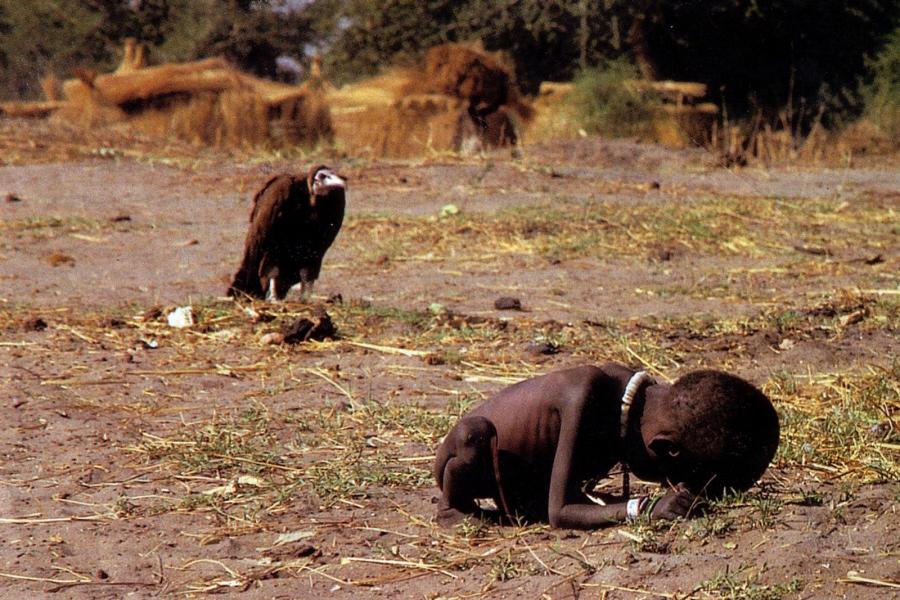A hungry vulture waits upon a starving Sudanese child, 1993

Date: 1993
Creator of the image: Kevin Carter Date of the image creation: 1993 Medium of the image: Photograph Person depicted: Unknown Sudanese girl Kevin Carter, then a relatively unknown South African journalist took this photograph of an emaciated girl near the village of Ayod in southern Sudan. Sudan was in the middle of a war between the central Sudanese government and the Sudan People’s Liberation Army that had lasted since 1983. About two million people in south Sudan died during the period 1983 to 2005, mostly from famine and disease caused by the war. Carter describes himself as waiting for about 20 minutes, hoping that the vulture would spread its wings. The girl’s parents were at a distance, collecting food from a UN plane, the same one that Carter has been used to enter the area. The vulture did not spread its wings. He took the photograph and chased the vulture away. The photograph first appeared in the New York Times on 26 March 1993, where it was described as a ‘metaphor for Africa’s despair’. Carter won the 1994 Pulitzer Prize for feature photography. In the immediate aftermath he wrote to his parents in Johannesburg, ‘I can't wait to show you the trophy. It is the most precious thing, and the highest acknowledgment of my work I could receive.’ Carter was both feted and heavily criticized. One newspaper editorial read, ‘The man adjusting his lens to take just the right frame of her suffering might just as well be a predator, another vulture on the scene’. Two months after receiving the Pulitzer prize, aged 33, Carter committed suicide. Scott Macleod writes: ‘His red pickup truck was parked near a small river where he used to play as a child; a green garden hose attached to the vehicle's exhaust funneled the fumes inside. "I'm really, really sorry," he explained in a note left on the passenger seat beneath a knapsack. "The pain of life overrides the joy to the point that joy does not exist."’ ‘The brief obituaries that appeared around the world suggested a morality tale about a person undone by the curse of fame. The details, however, show how fame was only the final, dramatic sting of a death foretold by Carter’s personality, the pressure to be first where the action is, the fear that his pictures were never good enough, the existential lucidity that came to him from surviving violence again and again — and the drugs he used to banish that lucidity. If there is a paramount lesson to be drawn from Carter's meteoric rise and fall, it is that tragedy does not always have heroic dimensions.’ ‘Kevin Carter was born in 1960, the year Nelson Mandela's African National Congress was outlawed. Descended from English immigrants, Carter was not part of the Afrikaner mainstream that ruled the country. Indeed, its ideology appalled him. Yet he was caught up in its historic misadventure. His devoutly Roman Catholic parents, Jimmy and Roma, lived in Parkmore, a tree-lined Johannesburg suburb — and they accepted apartheid.’ He died on 27 July 1994.
Quotes
No quotes found.
Login to add a quote